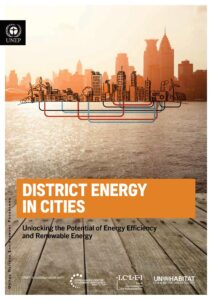 The Italian Ministry for Environment, Land and Sea today announced new support for a UN Environment initiative aimed at doubling the rate of energy efficiency improvements for heating and cooling in buildings by 2030 and so reducing greenhouse gas emissions.
The Italian Ministry for Environment, Land and Sea today announced new support for a UN Environment initiative aimed at doubling the rate of energy efficiency improvements for heating and cooling in buildings by 2030 and so reducing greenhouse gas emissions.
According to the International Energy Agency, CO2 emissions from the building sector need to be reduced by approximately 40 per cent by 2030 compared to 2010 levels as part of efforts to limit global temperature rise to two degrees Celsius this century.
The funding for the District Energy in Cities initiative, which sits under the Sustainable Energy for All (SEforALL) Partnership, will initially be aimed at district energy projects in Morocco, in particularly focusing on new district cooling networks in Marrakech.
“Italy is fully committed to action and acceleration on energy efficiency,” said Dr Federica Fricano, Head of the European Affairs Office at the Italian Ministry for Environment, Land and Sea. “The District Energy in Cities initiative is designed to help cities develop state-of-the-art district energy solutions. This is a very important step in delivering on the Paris Agreement and UN’s Sustainable Development Goals, and is a continuation of Italy’s support to local authority action.”
The initiative is already working with Bosnia and Herzegovina, China, Chile, India, and Serbia. The new partnership between Italy, Morocco and UN Environment will kick off the development of district energy across Africa, with other cities encouraged to consider joining the partnership. UN Environment research shows that modern district energy systems can reduce primary energy consumption for heating and cooling of urban buildings by up to 50 per cent. Such systems provide the only means to make use of waste heat to provide heat, cool and hot water services in buildings. District energy also allows for high levels of affordable renewable energy supply, making them a key measure for cities/countries that aim to achieve 100 per cent renewable energy or carbon neutral targets.
“We welcome the support of the Italian government and the UN Environment’s District Energy in Cities Initiative,” said Said Mouline, CEO of the Moroccan Agency for Energy Efficiency. “Without ambitious measures to transform our energy systems, electricity demand in Morocco could increase six fold by 2030, largely based on imported fossil fuels.
“Solutions like district energy will help us build low-carbon cities while also meeting our energy efficiency and renewable energy targets.”
Ibrahim Thiaw, deputy head of UN Environment, said, “Combatting climate change will need ambitious action on energy efficiency. The District Energy in Cities initiative is helping cities and countries take this action. Italy’s support accelerates our work and will enable Morocco to become a regional leader in district energy.”
About the District Energy in Cities Initiative:
The District Energy in Cities Initiative is a partnership coordinated by UN Environment, with financial support from Danida, the Global Environment Facility (GEF), and Italy. As one of five accelerators of the SE4All Energy Efficiency Accelerator Platform, the initiative will support market transformation efforts to shift the heating and cooling sector to energy efficient and renewable energy solutions. It aims to double the rate of energy efficiency improvements for heating and cooling in buildings by 2030 and quantify the corresponding decrease in greenhouse gas emissions.
About SE4ALL and the Global Energy Efficiency Accelerator Platform:
UN Secretary-General Ban Ki-moon launched Sustainable Energy for All in 2011 as a global initiative to provide universal access to modern energy service, double the global rate of improvement in energy efficiency, and double the share of renewable energy in the global energy mix. The Energy Efficiency Accelerator Platform was established to help reach the second of these objectives by supporting accelerated energy efficiency action in specific sectors, such as district energy, lighting, appliances, vehicle efficiency, buildings and industry.
Source: United Nations Environment Programme